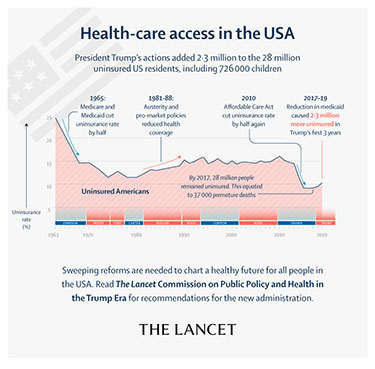An already-weakened health safety net, capped by devastating policies, actions and inactions during the Trump era, made America especially vulnerable to the COVID-19 pandemic, according to a new report from The Lancet Commission.
 U.S. deaths from COVID-19 could have been 40% lower had the country’s rates mirrored the level of other high-income nations, saving at least 180,000 lives, according to the Feb. 11 report. But even before the pandemic, U.S. health was deteriorating.
U.S. deaths from COVID-19 could have been 40% lower had the country’s rates mirrored the level of other high-income nations, saving at least 180,000 lives, according to the Feb. 11 report. But even before the pandemic, U.S. health was deteriorating.
“The COVID-19 pandemic has shown how woefully inadequate the country’s health care and public health system has been in protecting the nation’s health,” Richard Horton, FRCP, FRCPCH, FMedSci, editor-in-chief of The Lancet, said in a news release.
The report, “Public Policy and Health in the Trump Era,” is the product of four years of research by a 33-member commission of medical, public health, law and other experts from the U.S., U.K. and Canada. The 40-page report examines the health impact on Americans from former President Donald Trump’s policies, while also looking at four decades of actions that undermined U.S. social and health safety nets. Commission members examined issues such as immigration policies, the opioid epidemic, access to health care, nutrition and racism.
America’s health began a downward spiral in 1980 under former President Ronald Reagan, the commission found. Gains from the New Deal and the civil rights movement were undermined by Reagan-era policies. Inequities continued and grew for decades through both Republican and Democrat presidencies, even with the Affordable Care Act becoming law in 2010.
Many Trump-era policies, such as tax cuts for the wealthy and corporations and funding cuts to the social safety net, can be traced to Reagan’s political philosophy, the report noted. An income gap began that today has become a yawning chasm between the wealthy and the middle class.
Meanwhile, health care costs rose as overall health declined. Today, life expectancy in the U.S. is 3.4 years shorter than the average of G7 nations — Canada, France, Germany, Italy, Japan and the United Kingdom. In 2018, America had 460,000 excess deaths relative to those countries.
When the pandemic hit, America was not prepared, the commission said. Public health infrastructure and its workforce had been gutted, with funding cuts de-creasing the front-line public health workforce by 20%. Profit-based health care systems were unprepared for a national health emergency. Eleven percent of Americans became food insecure. U.S. life expectancy had fallen, substance use deaths were up and 11% of the nation was food insecure.
The Trump administration dismantled economic, health and social safety nets, making it harder for people to obtain health insurance. In 2019, over 34,000 U.S. deaths were associated with lack of health coverage, the commission estimated.
When the pandemic escalated in 2020, Trump mocked masking, spread disinformation and undermined science. He also blocked public health measures that would have helped protect people from the disease and forced states to compete for safety supplies for health workers.
“Trump’s mismanagement of the COVID-19 pandemic — compounded by his efforts to dismantle the USA’s already-weakened public health infrastructure and the Affordable Care Act’s coverage expansions — has caused tens of thou-sands of unnecessary deaths,” the report said. “Many of President Trump’s policies have yet to extract their full toll of ill-health. Some of the damage, as in the case of climate change, will last generations.”
The report offers recommendations that the Biden administration and other policymakers can use to improve U.S. health.
For example, reforming health care, enforcing civil rights and tackling systemic racism can help address some of the continuing gaps, members of the commission said in a Feb. 11 news briefing. Other recommendations include raising tax-es for high-income people, creating a national health insurance program and providing greater nutrition support for low-income families.
While the report found that the inequities faced by minority Americans are wide-spread and a serious barrier to health, Mary Bassett, MD, MPH, director of the François-Xavier Bagnoud Center for Health and Human Rights at Harvard University and an APHA member, said there is hope.
“Let’s join with others to change what we cannot accept,” Bassett said.
The Lancet Commission report and accompanying commentaries are available online.
The Lancet Commission report reveals the devastating harm Trump-era policies had on health and racial equity in the U.S. (Courtesy The Lancet Commission)